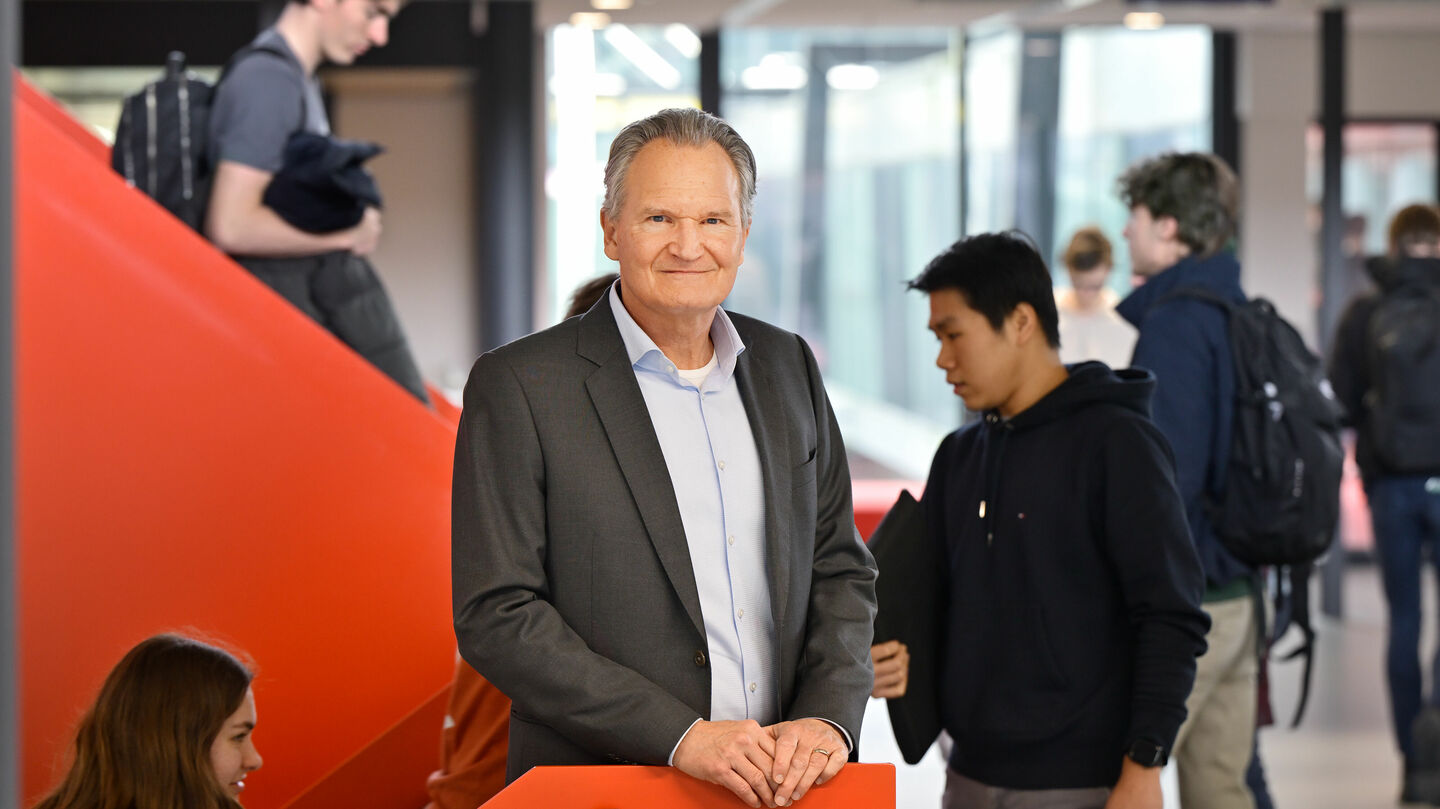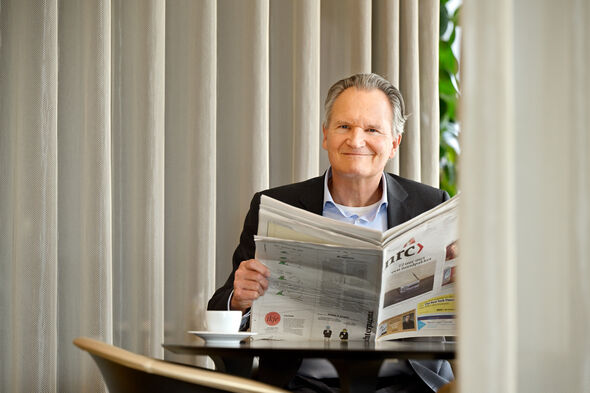
Robert-Jan Smits bids farewell to TU/e
“I’ve learned to let go of control a little bit.”
Like Alice in Wonderland, Robert-Jan Smits tumbled down the rabbit hole into academia six years ago. A new world that was markedly different from what he was used to at the European Commission in Brussels. “Here you’re not in charge, but you discuss things and have to be more patient.”
President of the Executive Board Robert-Jan Smits is leaving TU/e after six years. Thursday he will say goodbye and begin his retirement, although that doesn’t mean he’ll do nothing. “I’ll continue to work for the National Growth Fund and I’ll take up the position of chair of the Supervisory Board at Naturalis. I’m really looking forward to that.” He’ll also be doing country reviews for Iceland and Cyprus. “I’ll analyze science policy, as I spent years doing for the European Commission in Brussels.”
Letting go of control
Smits has learned a lot from his time at TU/e. “There’s so much going on here, so you can’t know everything. I still discover new things every day. That was very different in Brussels; nothing happened there without me knowing about it. I had to learn to let go of control a bit here.”
I was often told ‘Robert-Jan, this isn’t Brussels’ when I wanted to push something through. You really have to be patient
His tip to successor Koen Janssen, also someone with a lot of experience in an environment other than the university, is therefore not to expect to be the boss at TU/e. “Back when I was in Brussels, if I said that we were going to do something, it was already set in motion before I had finished speaking. Here, they think for a long time, discuss it among themselves, and maybe you get some feedback. I was often told ‘Robert-Jan, this isn’t Brussels’ when I wanted to push something through. You really have to be patient.”
I still have a stack of books I want to (re)read. Reading a few pages, I think, is a waste: I want to pull out all the stops
Coffee and newspaper
Smits looks forward to more peace and quiet and the opportunity to have a relaxed start to the day, with a cup of coffee and the paper. Reading for fun is something he hopes to do more of anyway. “I still have a stack of books I want to (re)read. Reading a few pages, I think, is a waste: I want to pull out all the stops.” He sometimes missed the peace of mind to do that. But he won’t miss being responsible for large sums of money and for the safety of a community of thousands of people. “As president of the Executive Board, you have to make impactful decisions, for example about human safety, chemicals, a flood, or an accident. That’s intense.”
Lobby
‘Those administrators in their ivory tower,’ you often hear people say. It says something about the perceived distance to administration. What work is invisible to the community? “The lobbying work, which takes up a lot of time. As an administrator, you talk a lot to politicians, locally, regionally, and nationally. About Project Beethoven and the cutbacks in education and research, for example.” Recently, Smits made headlines: he was named one of the most influential men in the region. “It’s nice to be seen, I won’t lie. But in the end I’m just happy to contribute something to the region.”
According to Smits, networking is very important for an administrator. “When I look at layoffs at other universities due to cutbacks and see how things are working out for us, I see a clear difference. We’re hiring people instead of having to lay them off. That has to do with the multi-million dollar investment from Project Beethoven and ASML, but the growth is also due to good financial policies. For which we, the board, are responsible.”
Smits is aware that the university’s collaboration with the business community is regularly criticized. “I understand that criticism, which is why we strictly adhere to the rules of ethics drawn up for scientific collaborations with companies, as laid down in the Netherlands Code of Conduct for Research Integrity. And ultimately, industry doesn’t want us to replicate their best machine either; that’s what they themselves do best. We should focus on developing the most innovative concepts. That’s also to their advantage, as it ensures they don’t miss out on new technology that would otherwise be made elsewhere.”
Things quickly became quite intense and we weren’t prepared for that. But I think we deal with it better now than we did in the beginning
Protests
During his time as an administrator, the number of protests – over climate issues, the Palestinian cause, and the right to protest – has increased significantly. At TU/e, but also in society in general. “I wasn’t familiar with that at all when I was Brussels. And when I started here, I don’t think it was common at other universities either. Things quickly became quite intense and we weren’t prepared for that. But I think we deal with it better now than we did in the beginning.”
As part of that process, the board invited human rights organization Amnesty International. “To learn what our rights are, as well as those of the protesters. That was interesting. I also saw that some of the protesters had a point. For example, in the initial institution plan there was no explicit focus on sustainability. I added that afterwards.”
Whistleblower procedure
Another tricky issue Smits faced during his presidency was the whistleblower procedure involving the Cursor editorial staff. An independent investigation committee concluded that the Executive Board had violated the internal rules regarding the freedom of press of the university platform. “At the time, we as a board didn’t fully realize what was going on. The report shed a lot of light on that. We recognized that things hadn’t gone well, and publicly admitted and talked it out in the end. It was a very intense period, but now we’re here, having a farewell interview. I think it’s very special when people are able to leave behind their feelings of resentment and misapprehension to seek reconciliation. I would hate to have left without patching things up.”
When Smits is asked what he’s most proud of, he doesn’t need very long to respond. “I think how I helped put TU/e on the map. The visibility of our university is good: we make the news quite often. And I’m equally proud of the Executive Board’s commitment to the community, especially in difficult times like the Covid pandemic.”
“Above all, I hope I’m leaving the university in a better state than when I started. Not that the university was in a bad state back then; I certainly don’t want to take anything away from my predecessors. You always build on someone else’s work and without them we wouldn’t have had a new sports center or student residential towers. Still, you want to add something yourself. And Koen will, in turn, build on the work I did.”
On Thursday, March 27, Robert-Jan Smits will say goodbye, with a ceremony in the Blauwe Zaal of the Auditorium that will last from 2 pm to 4:30 pm. The rabbit hole scene from Alice in Wonderland will definitely feature: “I tumbled down into an academic world I didn’t know and learned so much. Thank you for having me, I’ll miss you.”



Discussion